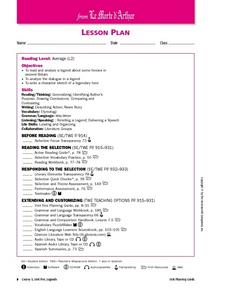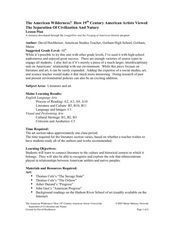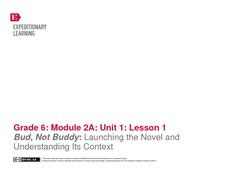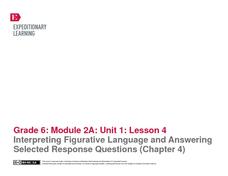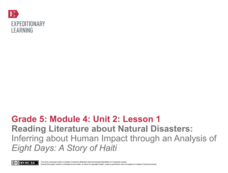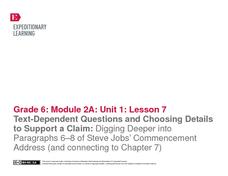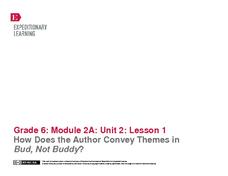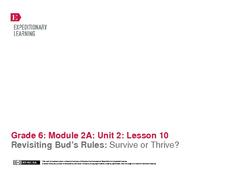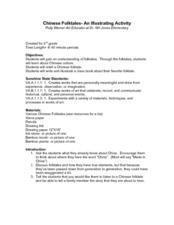Curated OER
Glencoe Literature Themes: Legends
Students prepare for and respond to literature selections. This package includes five lessons from the Glencoe Literature series, each covering a different reading selection. Pre-reading and response activities are included for each...
Curated OER
Social Studies and Children's Literature
Students are read a story about Alejandro and how he builds an oasis to attract animals. Using the text, they discover the needs of the animal not only for water but for safety. They discuss different environmental issues as well as...
Curated OER
Literature Circle Preparation
In this literature circle preparation worksheet, students draw a picture of something important in the story, summarize what they read, answer a teachers question, and write two new words they learned. Students answer a total of...
Curated OER
An Introduction to the Literature of World War I
Twelfth graders use internet research to gain an introduction to the Literature of World War I and gain an understanding of the essential humanity of soldiers on both sides of the conflict, and gain background information for the...
Curated OER
Literature: Truly Fortunate Ahmed
Students gain an appreciation for Persian literature by reading "Truly Fortunate Ahmed." They select props such as turbans, rings, and clothing as they are revealed in the story. Among assessments from which students choose are:...
Curated OER
Metaphors in Literature
Eighth graders analyze literature and the use of metaphors. In this metaphors lesson, 8th graders view and discuss the examples of metaphors. Students complete the phrases by writing in a metaphor.
Curated OER
Outline for a Response to Literature
Students analyze Out of the Dust by Karen Hesse. For this literature review lesson students analyze an example of a response to literature along with an outline for creating one. They then answer questions based on Out of the Dust to...
Curated OER
The American Wilderness? How 19th Century American Artists Viewed the Separation of Civilization and Nature
The attitudes of European settlers toward the American wilderness, as reflected in art and literature, is the focus of this resource packet designed for teachers. Included in the unit overview you will find lists or paintings and works...
Curated OER
Lesson: Urs Fischer: Controlling our Logic, Metaphors, and Semantics
Kids use poetry and contemporary art to start thinking about logic and personal expression. They read Sylvia Plath's poem "Metaphor," and critically examine the art of Urs Fischer. After working though a few logic problems they write...
EngageNY
Getting the Gist and Determining Word Meaning: Paragraphs 20–23 of Steve Jobs’ Commencement Address (and connecting to Chapter 10)
Groups create a list of the character traits of Steve Jobs and Buddy, the main character of Christopher Paul Curtis' Bud, Not Buddy, and share and select evidence from Jobs' 2005 Stanford University Commencement Address to support their...
EngageNY
Bud, Not Buddy: Launching the Novel and Understanding Its Context
The first lesson plan in a unit that uses Christopher Paul Curtis' award-winning depression-era novel, Bud, Not Buddy, as the anchor text establishes the routines that will be used throughout the unit.
EngageNY
Interpreting Figurative Language and Answering Selected Response Questions (Chapter 4)
To prepare for an assessment of how well individuals are progressing with their ability to identify and analyze figurative language and its effect on tone and meaning, pairs work through Chapter Four of Christopher Paul Curtis'...
EngageNY
Reading Literature about Natural Disasters: Inferring about Human Impact through an Analysis of Eight Days: A Story of Haiti
This is a disaster. Scholars look through the book Eight Days: A Story of Haiti and discuss their wonderings about the text and natural disasters. They then complete a first read to determine gist and second read to answer text-dependent...
EngageNY
Reading Literature about Natural Disasters: Inferring about the Impact of Hurricane Katrina on People Living in New Orleans
I survived! Scholars read a firsthand account from a natural disaster survivor in the text Save Bella! They record the gist of the text in their journals and answer text-dependent questions. They then take notes to more deeply analyze...
Curated OER
Graphs of the Heart
Students study Greek literature. In this Greek tragedies lesson, students explore the dance-dramas of Martha Graham. Students study the choreography that brings ancient Greek literature to life.
EngageNY
Text-Dependent Questions Text-Dependent Questions and Making a Claim: Digging Deeper into Paragraphs 12–14 of Steve Jobs’ Commencement Address (and connecting to Chapter 9)
Readers draw connections between Bud, Not Buddy and Steve Jobs' 2005 Stanford University commencement address and cite evidence from the two texts to support their analysis.
EngageNY
Getting the Gist: Steve Jobs Commencement Address (Focus on Paragraphs 6-8, and connecting to Chapter 6)
As part of a unit study of Bud, Not Buddy, readers compare Buddy's list of rules to live by with those that Steve Jobs enumerates in his commencement address to Stanford's 2005 graduating class.
EngageNY
Text-Dependent Questions and Choosing Details to Support a Claim: Digging Deeper into Paragraphs 6–8 of Steve Jobs’ Commencement Address (and connecting to Chapter 7)
Readers learn how to choose specific details drawn from a primary source (Steve Jobs' 2005 Stanford University commencement address) to support an analysis of informative text.
EngageNY
How Does the Author Convey Themes in Bud, Not Buddy?
After reading up to chapter 12 of Bud, Not Buddy by Christopher Paul Curtis, scholars read chapter 13 and take part in a grand conversation about the author's writing techniques. Pupils discuss how his writing conveyed literary themes...
EngageNY
Writing: Drafting Body Paragraphs and Revising for Language
Begin the drafting phase of the writing process with a lesson plan focused on logically writing three body paragraphs. Then, revise the writing to make it more formal after a teacher-directed mini-lesson plan. Each paragraph highlights...
EngageNY
Planning for Writing: Introduction and Conclusion of a Literary Argument Essay
After completing three body paragraphs of an argument essay about life's rules to live by from Bud, Not Buddy Christopher Paul Curtis, it's time to begin writing the introduction and conclusion. Independently, pupils draft the final two...
EngageNY
Revisiting Bud’s Rules: Survive or Thrive?
Bud followed a series of rules from Bud, Not Buddy by Christopher Paul Curtis. The question is, how did he use those rules to thrive or survive? After a grand discussion, class members explore the novel to locate and cite textual...
Curated OER
Chinese Folktales: An Illustrating Activity
In need of a really good lesson that incorporates literature, art, and cultural themes? After hearing a traditional Chinese folktale and discussing cultural themes and symbolism, learners create original illustrations for the story. This...
Curated OER
You and the Military
Do military recruiters plan to visit your campus? If so, the visit presents an opportunity for class members to engage in a series of action projects. Class members interview recruiters, propose a PTA meeting to discuss the pros and cons...
Other popular searches
- English Literature Genres
- 6 8 English Literature
- Old English Literature
- English Literature History
- Olde English Literature
- English Literature Unit
- English Literature O Level
- English Literature Form
- Older English Literature
- Early English Literature
- English Literature Unit 13
- English Literature Canadian


